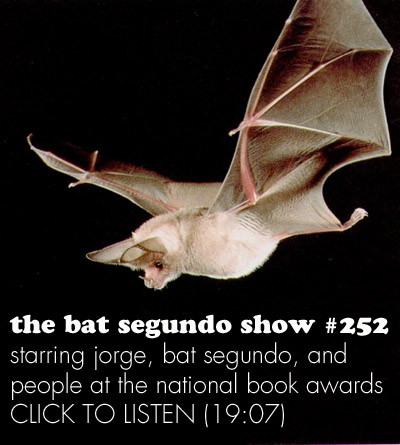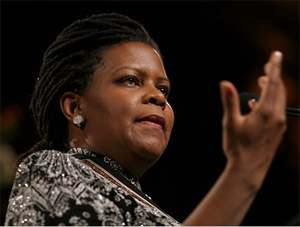Our reports from the National Book Awards previously appeared in piecemeal on these pages, and have also appeared on The Bat Segundo Show #252.
So far as we know, the National Book Awards has not authored anything aside from programs and informational pamphlets. The people that Our Young, Roving Correspondent talked with on that fateful night, however, have authored a few books. Or at least, this is what they have told us.

Condition of Mr. Segundo: Deeply suspicious of Harold Augenbraum.
Authors: Joan Wickersham, Annette Gordon-Reed, Salvatore Scibona, Mark Doty, Candace Bushnell, and Richard Howard.
Subjects Discussed: The difficulties of writing a memoir in straight chronological order, the paradox of suicide, having a handrail to guide you through the writing of a book, the Hemmings family, endnotes, the perils of plunging into research, working on a book for nine years, narrative arcs, attempts by finalists to describe a book in 100 words, planning a book for ten years, writing and throwing things away, typewriters and distractions, mixing up Cs and Ds, the difficulties of selecting poetry for a volume, wrestling with Walt Whitman, why Candace Bushnell reads what she reads, attempting to get an answer on how one exudes glamor at the National Book Awards, and how long it takes Richard Howard to write a poem.
EXCERPT FROM SHOW:
 Correspondent: How are you wrestling with Whitman exactly?
Correspondent: How are you wrestling with Whitman exactly?
Doty: Well, I want to think about the common ground that I share with Whitman. A real interest in the relationship between the individual — the single self — to the community. Whitman is always trying to figure out where the margins of himself are, and often he feels like he doesn’t have any. That’s been an obsession of mine too. He’s a person who was so interested in affirming the body, and the pleasures of sex and of physical life. And at the same time, he was a person who was absolutely obsessed with mortality and the end of physical life. So those are all things that matter to me. And I love the way that he really thought his poems could change the world.
* * *
Correspondent: And you’re here for the National Book Awards specifically in what capacity? To exude glamor or what?
Bushnell: To celebrate books. This is the business that I’m in. Publishing. I’ve written five novels. And this is about publishing. So it’s always a treat for writers to come out and see other writers.
BSS #252: 2008 National book Awards (Download MP3)
This text will be replaced
Listen: Play in new window | Download

 Correspondent: How are you wrestling with Whitman exactly?
Correspondent: How are you wrestling with Whitman exactly?